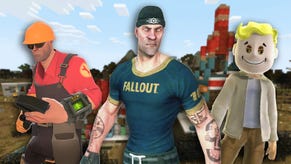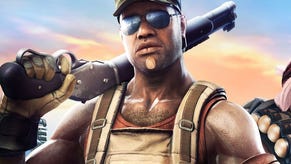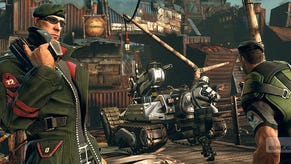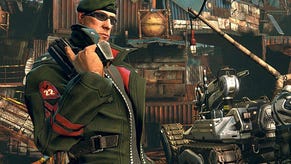Brink
Do the Smarties have the answer?
Civil unrest is brewing in Bromley, Kent. Its residents though, whether treading the floors of Poundland or waiting by the conveyor in Argos for a Swingball set, are blissfully unaware. Brink - set in 2025 on a futuro-archipelago called The Ark, which may be humanity's last outpost on a flooded earth - is a team-based, objective-driven, story-packed first-person shooter, but it's designed to appeal to n00bs and normals alike. And yet the streets are not full of pitchforks, burning cars and decapitated heads being waved up at Splash Damage's office windows. It's a brave new world.
In essence Brink is a team-based battle between two factions (Security and Resistance) with four different classes, gameplay-conjured individual objectives, experience-driven levelling and all manner of different styles of gunplay. The problem being that if you read that sentence to someone who got here via Cooking Mama and Brain Training, their head will probably explode, or they'll fall asleep.
But Splash Damage is trying to make its game accessible nonetheless, and one way to explain that process is to compare the developer's efforts to those of Lionhead with Fable II - an RPG rendered simples by glowy gems of hovered-up experience and a 'can't die' mentality. With the Splash boys having been burnt by the lacklustre performance of the complex Enemy Territory: Quake Wars on console, and with Team Fortress 2's relative failure on Xbox 360 in mind, it certainly makes sense to mimic Albion's easy-listening approach to hitpoints and goblins. It's no surprise to discover, then, that one of the developer's big hires for Brink was creative director Richard Ham, whose last job was heading up development on, yep, Fable II.
And there's certainly something familiar about one of Brink's most obvious concessions to accessibility - the Smart system, an acronym from Smooth Movement Across Random Terrain. As you may have read before now, with this you aim yourself in the direction you want to go, get moving and depress the Smart button. You'll soon be sliding over level furniture, leaping over gaps and clambering up onto ledges like no-one's business - with a notably smaller degree of super-articulate skill required than usual.
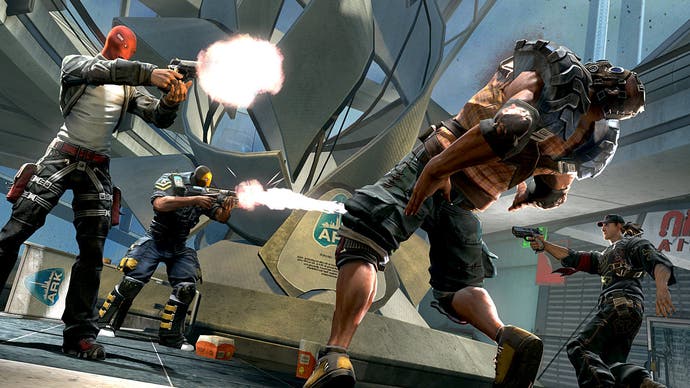
But there's a difference between this and Fable II's sometimes-overbearing simplification: "It's not an auto-pilot," as lead writer Ed Stern puts it, with a finger in the air and an arched eyebrow to indicate the importance of his words. If you're pulling off all the moves under your own steam, you might be able to do them better. "It just means that you don't spend time worrying about the interface - it means you can just focus on 'Do I want to go over here, or over there?' We make it easy for you. If you'd like to claim those jumps for yourself, you can - and I do. I don't use the Smart button that much, because I know that if I sprint I'll make that jump quicker."
The Mirror's Edge style limb-o-vision situational awareness and on-screen extremities as you roll and vault around the place, meanwhile, aren't canned animations - they can be interrupted and are all attuned to what's going on in the action. If you're vaulting a wall, you'll be able to shoot as soon as your right hand is disengaged, and reload once your left has concluded discussion with the shiny surface you're now atop.
It really is a beautiful system to watch in action. With Smart you'll be able to press the magic button and slide beneath an obstacle if you're looking downwards, or leap above if you're looking up, but you'll also be able to do snazzier things - rather than slide beneath a laser, or jump over a metal detector in a dilapidated airport, for example, you could slide silkily through the narrow-bag X-ray machine. And while your own acrobatics in Brink are great to behold anyway, when you've got 16 players leaping, sliding and vaulting around a map it's going to look even more impressive.
Another way that Brink is being rendered approachable is by merging single-player, co-op and multiplayer into one package, albeit with gradual unlocks, to ensure that the experience is a constant one whether playing with real people or bots. Splash Damage wants to avoid having a 'multiplayer' option that's translated into the more novice gamer's mind as being the one where you're continuously insulted by a teenager in Utah, and as such is attempting to hound out the potential for griefing. If other players aren't on your friends list, for example, you won't be able to talk to them unless you expressly state your desire to be wound up from afar. Clever matchmaking with an intent eye on the experience and level of combatants, meanwhile, is intended to keep gamers of a like mind together.


